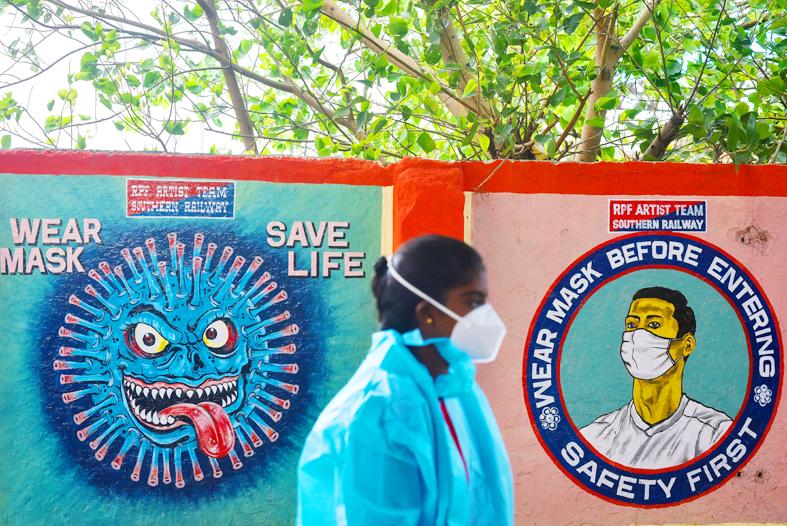The WHO yesterday said it had not seen any reports of deaths relating to the new Omicron variant of SARS-CoV-2.
The UN health agency said it was collecting evidence about the “variant of concern,” as countries around the world scramble to stop its spread.
However, despite a growing number of countries reporting infections with the new variant, no deaths have yet been reported to the agency.

Photo: EPA-EFE
“I have not seen reports of Omicron-related deaths yet,” WHO spokesman Christian Lindmeier told reporters in Geneva. “We’re collecting all the evidence, and we will find much more evidence as we go along. The more countries ... keep testing people, and looking specifically into the Omicron variant, we will also find more cases, more information, and, hopefully not, but also possibly deaths.”
The US and Australia earlier announced their first locally transmitted Omicron cases, as the new variant, first reported by South African scientists, has already cast the world’s recovery into doubt.
EU health authorities on Thursday warned that it could cause more than half of COVID-19 cases in Europe in the next few months.
More than two dozen governments have now detected Omicron cases — including India, one of the countries hardest hit by the COVID-19 pandemic since it began nearly two years ago.
A preliminary study by South African researchers suggests that the strain is three times more likely to cause reinfections compared with the Delta or Beta variants.
Michael Head, a scientist at the University of Southampton, said the research, which has not yet been peer reviewed, was “very concerning.”
Ten cases have so far been confirmed in the US, including five in New York announced on Thursday.
Two cases, reported in Hawaii and Minnesota, involved residents with no recent international travel history — signaling that the strain is already circulating inside the country.
“This is a case of community spread,” the Hawaii Health Department said.
The cases were reported as US President Joe Biden outlined his plans to battle COVID-19 during the winter, with new testing requirements for travelers and a surge in vaccination efforts.
“It’s a plan that I think should unite us,” he said.
All incoming travelers would need to test negative within a day before their flights, and rapid tests that cost about US$25 would be covered by insurance and distributed free to uninsured Americans.
Australia yesterday reported that a student with no history of foreign travel had tested positive for the Omicron variant.
The case, detected in Sydney, comes despite a sweeping ban on foreigners entering the country and restrictions on flights from southern Africa.
And just a day after Singapore reported two cases of the variant, Malaysia yesterday reported its first Omicron infections.
The case was detected in a foreign student traveling from South Africa, who had arrived in Malaysia on Nov. 19, Malaysian Minister of Health Khairy Jamaluddin said.
The case was only confirmed on Thursday, after officials conducted genome sequencing on samples taken from recent arrivals at Kuala Lumpur airport, he said.
The variant’s detection and spread represent a major challenge to efforts to end the pandemic, with several nations already reimposing restrictions many had hoped were a thing of the past.

A magnitude 7.0 earthquake struck off Yilan at 11:05pm yesterday, the Central Weather Administration (CWA) said. The epicenter was located at sea, about 32.3km east of Yilan County Hall, at a depth of 72.8km, CWA data showed There were no immediate reports of damage. The intensity of the quake, which gauges the actual effect of a seismic event, measured 4 in Yilan County area on Taiwan’s seven-tier intensity scale, the data showed. It measured 4 in other parts of eastern, northern and central Taiwan as well as Tainan, and 3 in Kaohsiung and Pingtung County, and 2 in Lienchiang and Penghu counties and 1

A car bomb killed a senior Russian general in southern Moscow yesterday morning, the latest high-profile army figure to be blown up in a blast that came just hours after Russian and Ukrainian delegates held separate talks in Miami on a plan to end the war. Kyiv has not commented on the incident, but Russian investigators said they were probing whether the blast was “linked” to “Ukrainian special forces.” The attack was similar to other assassinations of generals and pro-war figures that have either been claimed, or are widely believed to have been orchestrated, by Ukraine. Russian Lieutenant General Fanil Sarvarov, 56, head

FOREIGN INTERFERENCE: Beijing would likely intensify public opinion warfare in next year’s local elections to prevent Lai from getting re-elected, the ‘Yomiuri Shimbun’ said Internal documents from a Chinese artificial intelligence (AI) company indicated that China has been using the technology to intervene in foreign elections, including propaganda targeting Taiwan’s local elections next year and presidential elections in 2028, a Japanese newspaper reported yesterday. The Institute of National Security of Vanderbilt University obtained nearly 400 pages of documents from GoLaxy, a company with ties to the Chinese government, and found evidence that it had apparently deployed sophisticated, AI-driven propaganda campaigns in Hong Kong and Taiwan to shape public opinion, the Yomiuri Shimbun reported. GoLaxy provides insights, situation analysis and public opinion-shaping technology by conducting network surveillance

‘POLITICAL GAME’: DPP lawmakers said the motion would not meet the legislative threshold needed, and accused the KMT and the TPP of trivializing the Constitution The Legislative Yuan yesterday approved a motion to initiate impeachment proceedings against President William Lai (賴清德), saying he had undermined Taiwan’s constitutional order and democracy. The motion was approved 61-50 by lawmakers from the main opposition Chinese Nationalist Party (KMT) and the smaller Taiwan People’s Party (TPP), who together hold a legislative majority. Under the motion, a roll call vote for impeachment would be held on May 19 next year, after various hearings are held and Lai is given the chance to defend himself. The move came after Lai on Monday last week did not promulgate an amendment passed by the legislature that